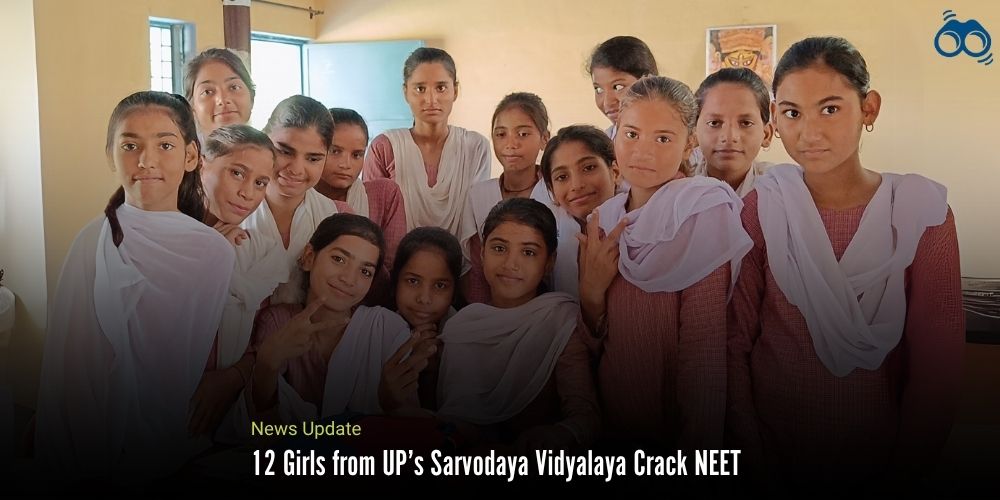A Milestone for Inclusive Education: Sarvodaya Vidyalaya’s NEET Achievers
From Struggle to Success: How Sarvodaya Vidyalaya Transformed Futures
Despite facing immense financial hardships, three young women, Princy, Pooja Ranjan, and Shweta, have overcome adversity to clear the NEET exam this year. Each of them, once believing that poverty would hinder their aspirations, has now demonstrated that determination and resilience can lead to success. Their achievement is not only a personal triumph but also a testament to the power of education in breaking barriers and shaping futures.
Their success represents a significant milestone for Sarvodaya Vidyalaya in Marihan, Uttar Pradesh, where 12 girls from disadvantaged backgrounds successfully passed one of India’s most challenging medical entrance exams. Of the 25 students who sat the exam, nearly half succeeded, an impressive feat for a school run by the state's social welfare department. This achievement highlights the critical role of accessible education and targeted support for students from SC/ST and OBC communities.
A key factor in their success was the free residential coaching provided at Sarvodaya, which offers classes from Year 6 to 12 alongside hostel facilities for children from economically weaker families. Social Welfare Minister Asim Arun explained that the selected students resided at Marihan Sarvodaya, where they pursued their regular studies and received dedicated NEET coaching, completely free of charge. Among them was Princy, who studied at Sarvodaya in Kaushambi until Year 10 before transferring to Marihan after qualifying for the NEET coaching programme. Pooja and Shweta followed a similar path, benefiting from the intensive preparation and structured guidance. Shweta admitted that she had never imagined achieving such success, while Pooja praised the quality of coaching and frequent assessments that enhanced her preparation. Though initially uncertain about the programme’s effectiveness, she acknowledged that her dedication, coupled with government support, ultimately enabled her to realise her dream.
The students' accomplishments have greatly enhanced Sarvodaya Vidyalaya’s reputation. NEET coaching at Marihan commenced as a pilot project in 2024, backed by Tata AIG and the Ex-Navodayan Foundation, an alumni network of Navodaya schools. Social Welfare Minister Asim Arun explained that families from Marihan and nearby areas were approached, and selected girls were transferred to Marihan with parental consent.
Out of the 39 girls who received coaching for NEET and JEE, 25 appeared for NEET, and 12 successfully cleared the exam. Social Welfare Director Kumar Prashant described Marihan as a "centre of excellence", noting that the coaching model would now be expanded across other Sarvodaya Vidyalayas in Uttar Pradesh, which presently has around 100 such institutions. This initiative promotes equal educational opportunities for aspiring medical students and establishes a strong foundation for widening access to quality education, enabling young women to pursue their ambitions without limitations.
Editor’s Note:
The outstanding success of Princy, Pooja Ranjan, Shweta, and their fellow students from Sarvodaya Vidyalaya in Marihan stands as a clear example of what determination and opportunity can achieve. These young women, all from financially disadvantaged backgrounds, once thought that studying medicine was beyond their reach. Yet, with hard work, support, and focus, they overcame the odds and passed the NEET exam, showing that talent is not limited by income. A key factor in this success was the free residential coaching at Sarvodaya Vidyalaya, supported by the state government and partners like Tata AIG and the Ex-Navodayan Foundation. It provided quality education at no cost, along with structured lessons, regular tests, and strong mentorship that built the students’ confidence and ambition. Their journey is a powerful reminder that education should be a right, not a privilege. It highlights how focused government schemes, institutional backing, and individual effort can work together to support those often left behind. This success story should encourage schools and policymakers across the country to adopt similar models, so that capable students, regardless of their circumstances, have the tools and support they need to succeed. Focused government initiatives, strong institutional support, and individual determination show that education is a right that can empower marginalised students to succeed. This approach should serve as a model for schools and policymakers across the country.
Skoobuzz applauds the achievements of these students. Their success is more than a personal milestone; it is a powerful example of inclusive education and a reminder that every child with potential deserves an equal opportunity to shape a brighter future.














0 Comments (Please Login To Continue)